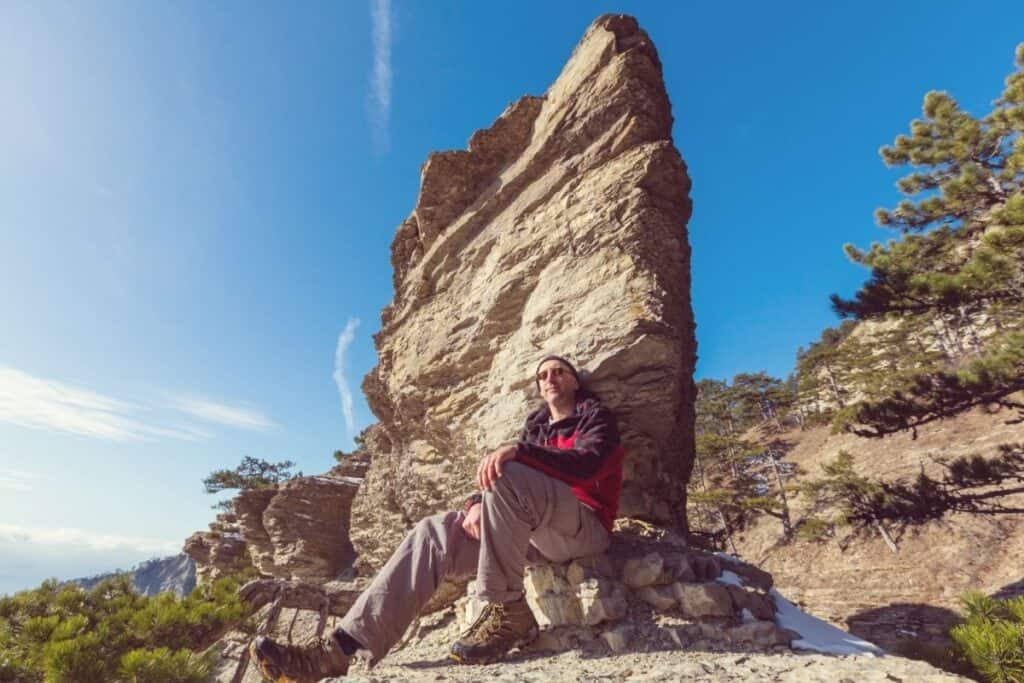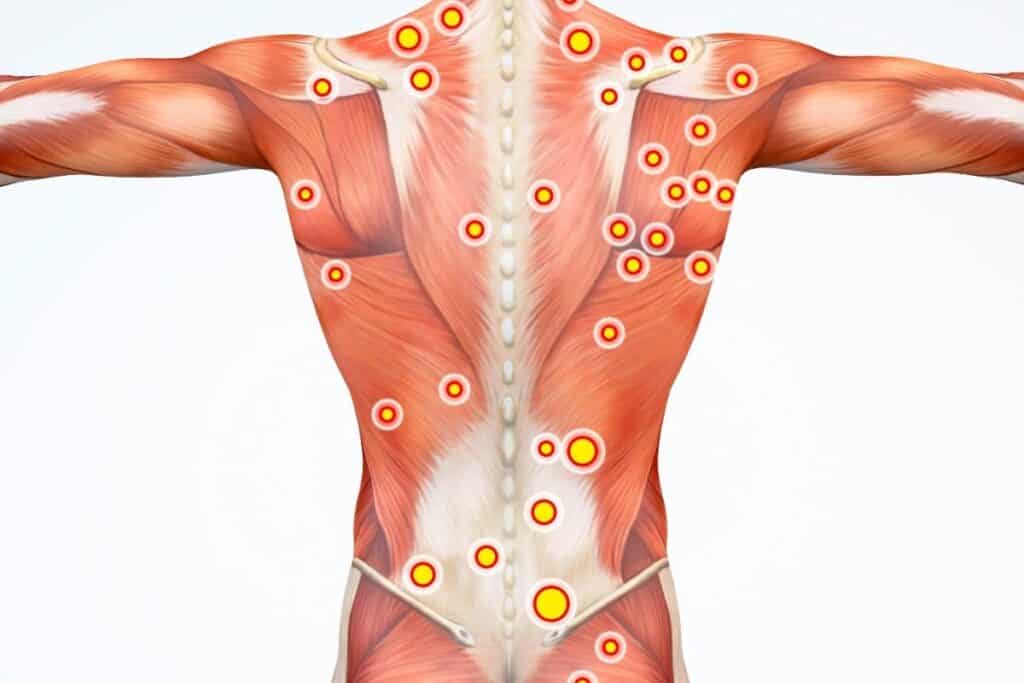
If you’ve ever been bored in the gym, you might have found yourself wondering: is hiking a good alternative to the gym? Between the physical exercise and joy of the outdoors, it can be a great option for many.
Both hiking and going to the gym are excellent forms of exercise. While hiking does provide added benefits from being outside, the determination of which is better will depend on your goals.
With that in mind, let’s dive in to see exactly where each of these forms of exercise shines and which is right for you!
Hiking vs The Gym
I’d like to start off by pointing out that both hiking and going to the gym are great options for physical activity. If it’s results that you’re after, either of these will clearly be better than sitting around watching television!
While each activity has its benefits, the question of “which one is better?” really depends on what your goals are.
For example, let’s take a look at few common scenarios that you might consider:
- Are you just looking for a general form of exercise?
- Do you want to get lean or are you trying to build lots of muscle?
- Is spending more time outside important?
Keep in mind that these are just a few of the things that you may be considering when trying to choose between going to the gym or going for a hike!
If you’re just looking for a general form of exercise, then I’d say that both hiking and the gym offer similar benefits. Getting out and moving will increase blood circulation, get your heart pumping, and force your muscles to do some work.
These are all good outcomes compared to sitting at your desk!
Now when it comes to body recomposition, I’d also argue that you can actually achieve good results with both hiking and the gym. Both involve working your muscles and elevating your heart rate which are needed to elicit body changes.
However, neither of these activities address the most important factor for body composition – NUTRITION!
You’ll need to spend just as much time and effort focusing on what you eat in order to fully achieve your goals. And this applies whether your goal is to get leaner or build muscle!
Last but not least, we’ve got to talk about the great outdoors. While getting your workout in at the gym compares favorable to hiking in many areas, this is one area where it falls short.
Hiking allows you to be outside, get some sun on your face, and breathe in some fresh air. Not only does this provide physical benefits from getting more vitamin D, but you’ll also experience emotional benefits as well.
Hiking is a very meditative activity for many. Being able to enjoy a quiet and peaceful hike is a great break from the hectic and ever-connected lives that many of us live today.
In fact, a study by Stanford University researchers found that “people who walked for 90 minutes in a natural area, as opposed to participants who walked in a high-traffic urban setting, showed decreased activity in a region of the brain associated with a key factor in depression.”
Is Hiking Good for Muscle Building?

So, does hiking work to build muscle? It depends on what kind of muscle you want to build.
If you want to build bulky, showy muscles and impress your friends and peers, you might be better off hitting the gym. But if you want a toned, strong physique, hiking works great.
Hiking works slow-twitch muscles, which are the kinds of muscles that handle activities sustained over a long period. When you see bodybuilders lifting, they’re working fast-twitch muscles, which handle explosive movement.
This is why your average marathon runner is much stringier when compared to your average sprinter.
But just because you’re going to be building less mass doesn’t mean you’re not making any progress. It’s one thing to want a strong-looking body, but it’s another to build one with actual power and strength. Strength is exactly what hiking gives you.
When you hike, you slowly tear muscle fibers that repair themselves in new and often more efficient ways. So over time, your body will build up greater strength and balance, as well as cardiovascular health.
As for your muscles, they will become more toned. This means that the ratio of fat to muscle in your body will decrease, and the shape of your muscles will start to be more pronounced. So, while hiking won’t build big body-builder muscles, it will certainly make your muscles a little more shapely.
What Muscles Does Hiking Build?
Hiking engages your lower-body muscles from your calves to your core. These include your calves, quads, hamstrings, core, and lower back.
Let’s start with your calves. Your calves are the bulges of muscle behind your shins from your heels to the backs of your knees. When you hike, these muscles are used to lift your heels upward and propel your toes forward.
Hiking acts sort of like a continuous stretch of calf raises in this sense.
Additionally, your quads- the muscles on the fronts of your thighs- are engaged in balancing and creating forward motion. To lift the weight of your body and whatever equipment you might be carrying you need a lot of power, so all of the muscles in your legs are hard at work.
Your hamstrings live just behind your quads on the backs of your legs and split a lot of the work with them.
Your core – the section between your chest and pelvis including your lower back and abdomen- is also hard at work trying to create the pivoting motion needed to swing your legs, and to balance your upper body so that you don’t fall over.
All of this tears muscle fibers and creates the conditions for gradual muscle buildup.
Does Hiking Help Lose Weight?
Absolutely!
Hiking is an aerobic activity, which means that it occurs in the presence of oxygen. Since it goes on for such a long time, your body can take in more oxygen and use it to create energy. To do this, it often uses its store of fat. With a proper diet, hiking will burn these fat-stores.
When you hike, you can burn up to 400 calories in an hour. If you’re going on two or three-hour hiking trips every so often, this can be just as effective for fat burning as going on a jog.
Hiking alone, however, is not going to magically take off the pounds.
To lose fat, there has to be a disparity between the number of calories you take in and the number of calories you expend.
When you take in more calories than you expend in a day, the excess calories are turned into fat- which is why your belly starts hanging over your gut if you don’t watch what you eat.
However, if you expend more calories than you take in, your body has to use some of its stored up energy to keep going. This is why the body produces fat- to keep us going on days when we might not have very much to eat.
When you hike, you burn an enormous amount of calories. You can speed up or slow down your pace to increase or decrease the amount of energy you expend, or you can add more weight to your pack.
As you do this, your muscles will pop out more because there’s less fat to get in the way. This is what’s called ‘toning.’ Additionally, your veins will start to become more visible, which is one of the benefits weightlifters often notice.
Does Hiking Burn Belly Fat?
Since hiking is a fat-burner in general, yes, it will burn belly fat.
Belly fat is a subcutaneous (below the skin) layer of fat that builds up over long periods. Poor diet, lack of exercise, and stress all cause belly fat to build up. Hiking can help alleviate all of these issues.
When you hike, you often feel the need for nutrients a lot more powerfully than you would sitting on the couch. If you pay attention to the signals your body gives you and do your research, you will be able to build up a good diet that makes you feel your best while hiking.
Additionally, hiking is a highly effective exercise that can help improve fitness in many areas. For our purposes though, we just need to look back at the previous section.
Hiking expends an enormous amount of calories, and if you’re watching what you eat, you’ll have a lower amount of calories in than out. This will make your body use up fat to create energy, which will burn belly fat.
Lastly, hiking reduces stress, which can help you to lose excess weight!
Studies have shown that regular exercise works to lessen the negative impacts of stress. Cortisol- the stress hormone- has been linked to belly fat, and there is less of it when there is less belly fat. So, hiking may even help to eliminate the stress that helps create belly fat.
Is Hiking Better Than Walking?
Yes, hiking is a better exercise than walking.
If you’re walking on a flat surface like a road or a treadmill, you’re not doing as much work or putting as much stress on your muscles. Additionally, you might be carrying a heavy backpack or other equipment while hiking, which increases your energy expended.
So, when you hike, you use more energy, burn more fat, and build more lean muscle. In terms of the kinds of aerobic activities you can do at the gym, hiking has a pretty noticeable advantage.
And walking on a road or treadmill simply can’t match up to the beautiful sights and serenity that one finds when hiking a path in the woods or up the side of a mountain.
So, Is It Better Than The Gym?
Overall, there are many things hiking can do that the gym can’t, and vice-versa.
If you’re looking to get ripped and stand around flexing in mirrors, high-intensity training at a gym is right for you. Hiking is more spread out and works different muscle fibers from weight lifting routines.
However, hiking still works a lot of the muscles you work at the gym, and more, in different ways. Some people find it hard to hit the lower back, for example, and even more find squats exhausting and annoying.
And speaking of exhausting and annoying – have you ever tried running on a treadmill for an hour without headphones?
Reaching into your pocket and realizing you forget your headphones at home is like a death sentence at the gym. Now you’re stuck listening to the sounds of grunting and blaring pop music.
The outdoors doesn’t present this issue. From the songs of birds to the sound of wind moving through the canopy, nature is peaceful and pleasant whether you’re headphoned-up or unplugged.
Lastly, hiking improves strength in the muscle groups we’ve mentioned, which may be an advantage over the showy muscles you build on a bench press or squat machine. These muscles also become better at the jobs they do and can do them for a much longer time. This is called endurance, and many people see it as the most important factor in physical fitness.
Overall hiking can be a good alternative to the gym if you’re looking to burn fat and build lean muscle, endurance and strength.
Additional Related Articles
Make sure to take a look at these helpful related articles before you go!
